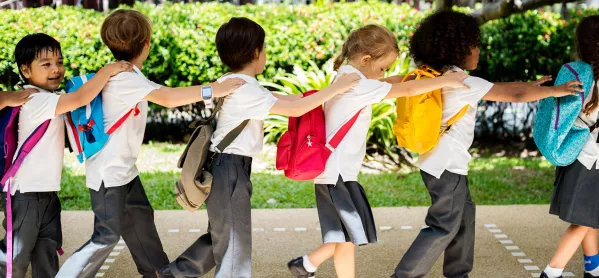
Will pupils struggle to get back into a school routine?

Getting children back to school and back into their normal routines is on everyone’s minds as schools look to reopening and reengaging their students.
But before we rush to get back to pre-lockdown life, it is perhaps timely to reflect on our notions of “normal” routine and the lessons learned from lockdown.
A return to normality will take time, and the negative consequences of lockdown, such as its effect on academic attainment and social skills, may present significant challenges that are yet to be determined.
But if approached with an open mind, the past year need not be regarded as purely negative “lost time”. The lockdown experiences of our children may bring some positive longer-term outcomes.
Routine: what the research says
Psychologists, parents and teachers all recognise the importance of regular and stable childhood routines for successful development.
Routines save us time and energy, lessening our need to make constant decisions. They give us control and make us feel secure, providing a sense of belonging that allows children to develop within a framework of security and consistency.
However, from a psychological perspective, rigid predetermined routines, controlled by adults, are not always beneficial for development.
A fundamental part of growing up is learning how to explore the world and tackle new challenges. Time spent by children in less structured activities, such as playing on their own, promote the control mechanisms that support higher-level processes.
These include planning, multitasking and decision-making. If children learn to manage their own time, important life skills such as self-belief and confidence in their ability to achieve their own goals can be achieved.
Boredom can also be a motivating force, encouraging children to seek out new experiences, promoting creative and intelligent thinking, as well as reflection. The loss of rigid routines in all aspects of lockdown life created opportunities for children to develop and use their own imagination and creativity.
Rushed repetition
Pre-lockdown, a substantial amount of many children’s out-of-school time consisted of homework and organised enrichment activities. Rushed and repetitive meal times fitted around these activities.
But lockdown has often allowed children to have more involvement, for example in meal preparation, and more time for conversation, negotiation and play - activities we know to be psychologically beneficial.
Early published studies are indicating that parental flexibility and family resilience have been linked to greater family cohesion, supporting children’s adjustment to their lockdown world.
A new normal?
Caution now needs to be taken in the return to “normality” and teachers are going to be at the forefront of this transition. A year is a comparatively long time in the life of a young child and new routines will have been established in this time.
A return to the classroom and reunion with friends is undoubtedly a positive thing. But we must remember that, for many, the return to school is another unanticipated transition over which they have no control.
How to manage routines on return:
Go easy on new information
Students may feel worried and scared at the loss of familiar home routines and are likely to become tired, overwhelmed and anxious until they re-establish new ones. It is important that they are not bombarded with rules in this period, but instead have time to accommodate new information and establish a new life balance.
Examine routines explicitly
For older pupils, the concept of routine itself (why we have routines and what happens when routines change), could provide useful learning skills and give a more positive framework within which the past year will be remembered.
Be positive about wins
Lockdown presented us with an opportunity to reflect and take stock. Teachers, parents and students have communicated and co-operated in ways they never anticipated, learning and working together, and gaining a new appreciation of the challenges of each other’s roles.
These positive outcomes need to be recognised and acknowledged and, if possible, incorporated into future strategies, for example the use of online meetings and teaching.
Teachers and parents will now play an important role in shaping and influencing children’s memories of the pandemic. It would be wrong to focus solely on “lost learning”, forgetting or dismissing the unexpected achievements and progress, as recently emphasised by the British Psychological Society.
Early discussions in the classroom could focus on the positive skills, experiences and knowledge attained during lockdown. For example, in the use of technology, more knowledge of their local area and importance of community spirit and working together.
Academic attainment may well have been set back, but it is likely that many new life skills - such as increased resilience, flexibility, reflection and adaptability - have been gained.
Teachers, parents and children have negotiated an international crisis, and all should be rightly proud of themselves.
You need a Tes subscription to read this article
Subscribe now to read this article and get other subscriber-only content:
- Unlimited access to all Tes magazine content
- Exclusive subscriber-only stories
- Award-winning email newsletters
- Unlimited access to all Tes magazine content
- Exclusive subscriber-only stories
- Award-winning email newsletters
You need a subscription to read this article
Subscribe now to read this article and get other subscriber-only content, including:
- Unlimited access to all Tes magazine content
- Exclusive subscriber-only stories
- Award-winning email newsletters
- Unlimited access to all Tes magazine content
- Exclusive subscriber-only stories
- Award-winning email newsletters
